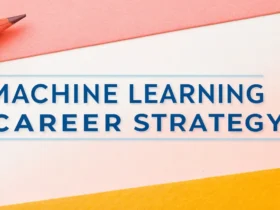So, you want to work in artificial intelligence (AI)? You are not alone. AI is not just a buzzword; it’s reshaping industries and creating exciting career paths. It might seem daunting to break into, but with the right roadmap, you can navigate this field, even as a beginner.
This article is your guide to breaking into artificial intelligence. We’ll explore the skills you need, the steps you can take, and the different roles you can pursue. The path might have some turns, but it is doable. Let’s get started.
What is Artificial Intelligence, Anyway?
At its core, artificial intelligence is about making machines smart. We’re talking about machines that can learn, solve problems, and make decisions, much like us. AI covers a lot, from simple programs to complex systems.
Think about the spam filter in your email. That’s a basic form of AI, learning to identify and filter out unwanted messages. Then there are things like self-driving cars, which use advanced AI to navigate roads and avoid obstacles. It’s a field with amazing possibilities.
Why is Everyone Talking About AI?
AI is getting a lot of buzz for good reasons:
- Automation: AI can automate tasks, saving time and money for businesses.
- Data Analysis: AI can crunch massive datasets to find patterns and insights humans might miss.
- Innovation: AI is leading to new products and services, transforming industries.
- Problem Solving: AI helps tackle complex problems in healthcare, climate change, and more.
The demand for AI skills is soaring. Businesses need people who can build, implement, and manage AI systems. This demand is what makes it a great time to start learning about artificial intelligence.
Who Thrives in the World of Artificial Intelligence?
AI is open to people from various backgrounds, but certain traits will help you succeed:
- Problem Solvers: You enjoy tackling complex problems and finding creative solutions.
- Lifelong Learners: AI is always changing, so you’re willing to constantly learn and adapt.
- Detail-Oriented: You pay attention to details and are good at analyzing data.
- Team Players: You can work well with others, as AI projects often involve collaboration.
- Curious Minds: You have a natural curiosity and a desire to understand how things work.
If these traits sound like you, then AI might be a great fit.
What Skills Do You Need to Break Into Artificial Intelligence?
Okay, time to talk skills. You might think you need to be a math genius, but that’s not always the case. Here are some key areas to focus on:
Core Technical Skills
- Programming: Python is king in the AI world. It’s easy to learn and has tons of libraries for AI and machine learning. Other useful languages include R, Java, and C++.
- Mathematics: Don’t panic! You don’t need to know everything, but a good grasp of linear algebra, calculus, probability, and statistics is helpful.
- Machine Learning (ML): This is where you teach machines to learn from data. You’ll need to understand different algorithms and techniques.
- Deep Learning (DL): A subset of machine learning that uses neural networks. It’s behind many of the latest AI breakthroughs.
- Data Science: AI thrives on data. Learn how to collect, clean, analyze, and visualize data to extract meaningful insights.
Essential Soft Skills
- Communication: You need to explain complex technical concepts to non-technical people.
- Problem-Solving: AI is all about solving problems, so strong analytical and critical-thinking skills are crucial.
- Collaboration: You’ll likely work in teams, so being a good team player is essential.
- Creativity: AI is still evolving, so you need to be creative and think outside the box.
- Business Acumen: Understanding how AI can solve business problems is a big plus.
Nice-to-Have Skills
- Cloud Computing: Platforms like AWS, Azure, and Google Cloud are widely used for AI development.
- Big Data Technologies: Tools like Hadoop and Spark can help you process large datasets.
- Natural Language Processing (NLP): If you’re interested in working with text or speech data, NLP is a valuable skill.
- Computer Vision: If you want to work with images or videos, understanding computer vision is important.
- Robotics: If you’re interested in building intelligent robots, you’ll need knowledge of robotics.
A Step-by-Step Roadmap to Your Artificial Intelligence Career
Here’s a practical plan to help you get started:
Step 1: Build a Strong Foundation
Start with the basics. Enroll in introductory courses on Python, mathematics, and statistics. There are many online resources available:
- Coursera: Offers courses on machine learning, deep learning, and data science from top universities.
- edX: Provides similar courses with a focus on academic rigor.
- Udacity: Has nanodegree programs specifically designed for AI and machine learning careers.
- Khan Academy: Great for brushing up on math and statistics fundamentals.
Step 2: Dive Deeper into Machine Learning
Once you have a foundation, focus on machine learning. Learn about different algorithms, such as:
- Linear Regression: A simple algorithm for predicting continuous values.
- Logistic Regression: Used for classification problems.
- Decision Trees: Easy to understand and visualize.
- Support Vector Machines (SVM): Powerful for complex classification tasks.
- Neural Networks: The building blocks of deep learning.
Step 3: Get Hands-On with Projects
Theory is great, but practice is key. Work on personal projects to apply what you’ve learned. Some ideas:
- Image Classification: Build a model to classify images (e.g., cats vs. dogs).
- Sentiment Analysis: Analyze text data to determine the sentiment (positive, negative, neutral).
- Predictive Modeling: Predict customer churn or sales using historical data.
- Recommendation System: Build a system to recommend products or movies to users.
Step 4: Master Deep Learning
If you’re interested in cutting-edge AI, dive into deep learning. Learn about neural network architectures like:
- Convolutional Neural Networks (CNNs): Used for image and video processing.
- Recurrent Neural Networks (RNNs): Used for sequential data like text and time series.
- Transformers: Revolutionized NLP and are now used in many areas of AI.
Use frameworks like TensorFlow and PyTorch to build and train your own neural networks.
Step 5: Showcase Your Skills
Create a portfolio to showcase your projects and skills. This could be a website, a GitHub repository, or a combination of both. Highlight your accomplishments and explain your approach to each project.
Step 6: Network and Connect
Attend AI conferences, workshops, and meetups. Connect with other AI enthusiasts and professionals on LinkedIn. Networking can open doors to job opportunities and collaborations.
Step 7: Seek Internships or Entry-Level Roles
Look for internships or entry-level roles in AI or related fields. This could be as a data scientist, machine learning engineer, or AI researcher. Even if the role isn’t exactly what you want, it’s a great way to gain experience and build your resume.
Step 8: Stay Updated
AI is a rapidly evolving field, so it’s important to stay updated on the latest trends and technologies. Follow AI blogs, read research papers, and participate in online communities.
Choosing Your Path: Different Artificial Intelligence Career Options
AI isn’t just one job. Here are a few options:
Machine Learning Engineer
- What They Do: Build and deploy machine learning models. They work closely with data scientists to put models into production.
- Skills Needed: Strong programming skills, machine learning expertise, cloud computing knowledge.
- Job Outlook: Excellent, with high demand for skilled professionals.
Data Scientist
- What They Do: Analyze data to extract insights and build predictive models. They use statistics, machine learning, and data visualization techniques.
- Skills Needed: Data analysis skills, machine learning knowledge, programming skills, communication skills.
- Job Outlook: Very good, as companies increasingly rely on data-driven decision-making.
Artificial Intelligence Researcher
- What They Do: Conduct research to advance the field of AI. They develop new algorithms and techniques, and publish their findings in academic journals.
- Skills Needed: Strong research skills, deep understanding of AI concepts, programming skills, math skills.
- Job Outlook: Competitive, but rewarding for those passionate about pushing the boundaries of AI.
Natural Language Processing (NLP) Engineer
- What They Do: Develop AI systems that can understand and process human language. They work on tasks like chatbots, machine translation, and sentiment analysis.
- Skills Needed: NLP expertise, machine learning knowledge, programming skills, linguistics knowledge.
- Job Outlook: Growing, as more companies seek to improve their communication with customers through AI.
Computer Vision Engineer
- What They Do: Build AI systems that can “see” and interpret images and videos. They work on tasks like object detection, image recognition, and video analysis.
- Skills Needed: Computer vision expertise, machine learning knowledge, programming skills, image processing skills.
- Job Outlook: Increasing, as computer vision is used in many applications, such as self-driving cars and facial recognition.
Artificial Intelligence Consultant
- What They Do: Advise companies on how to implement AI solutions. They help businesses identify opportunities to use AI and develop AI strategies.
- Skills Needed: Business acumen, AI knowledge, communication skills, problem-solving skills.
- Job Outlook: Good, as more companies seek expert advice on how to leverage AI.
Level Up: Building a Portfolio That Gets Noticed
A portfolio is your chance to stand out. It shows potential employers what you can do.
- Choose Projects Wisely: Focus on quality over quantity. Select projects that demonstrate your skills and align with your career goals.
- Document Your Process: Explain your approach, the challenges you faced, and the solutions you implemented.
- Highlight Results: Quantify your results whenever possible. How accurate was your model? How much did you improve performance?
- Use Visuals: Include screenshots, diagrams, and other visuals to make your portfolio more engaging.
- Get Feedback: Ask for feedback from other AI professionals and use it to improve your portfolio.
Navigating the Job Search
Alright, you’ve got the skills and the portfolio, now it’s time to find a job.
Tailor Your Resume
Customize your resume for each job you apply for. Highlight the skills and experience that are most relevant to the specific role.
Write a Strong Cover Letter
Use your cover letter to explain why you’re interested in the company and the role, and how your skills and experience make you a good fit.
Prepare for Technical Interviews
Technical interviews in AI often involve coding challenges, algorithm questions, and discussions about your projects. Practice coding and review AI concepts.
Highlight Your Soft Skills
Don’t forget to showcase your soft skills. Emphasize your communication, problem-solving, and teamwork abilities.
Ask Questions
During the interview, ask questions about the company, the team, and the role. This shows that you’re engaged and interested.
The Importance of Continuous Learning
Artificial intelligence is never static; it’s like a river, always flowing and changing. New algorithms and technologies come out all the time. You need to make a habit of learning constantly to keep up.
- Read Research Papers: Stay up-to-date on the latest advances by reading research papers.
- Follow Industry Blogs: Blogs like Towards Data Science and the Google AI Blog offer insights and tutorials.
- Take Online Courses: Continue to expand your knowledge by taking online courses on new topics.
- Attend Conferences: Conferences like NeurIPS and ICML are great for learning about the latest research and networking with other professionals.
- Participate in Communities: Engage in online communities like Reddit’s r/MachineLearning and Stack Overflow to ask questions and share knowledge.
Common Roadblocks and How to Overcome Them
The path to an AI career isn’t always easy. Here are some challenges you might face and how to overcome them:
- Lack of Experience: Start with personal projects and contribute to open-source projects to gain experience.
- Math Anxiety: Focus on building a solid foundation and practice applying math concepts to AI problems.
- Imposter Syndrome: Believe in yourself and your abilities. Remember that everyone starts somewhere.
- Keeping Up with Technology: Set aside time each week to read research papers and follow industry blogs.
- Job Search Frustration: Don’t get discouraged by rejections. Keep applying and networking, and eventually, you’ll find the right opportunity.
Artificial Intelligence: Should You Take the Plunge?
Breaking into artificial intelligence takes effort, but it is doable. AI is transforming so many fields. You might start with small steps. You can take one course, do one project, and just keep on going. The world of AI is vast and waiting for you to explore.















Leave a Reply
View Comments